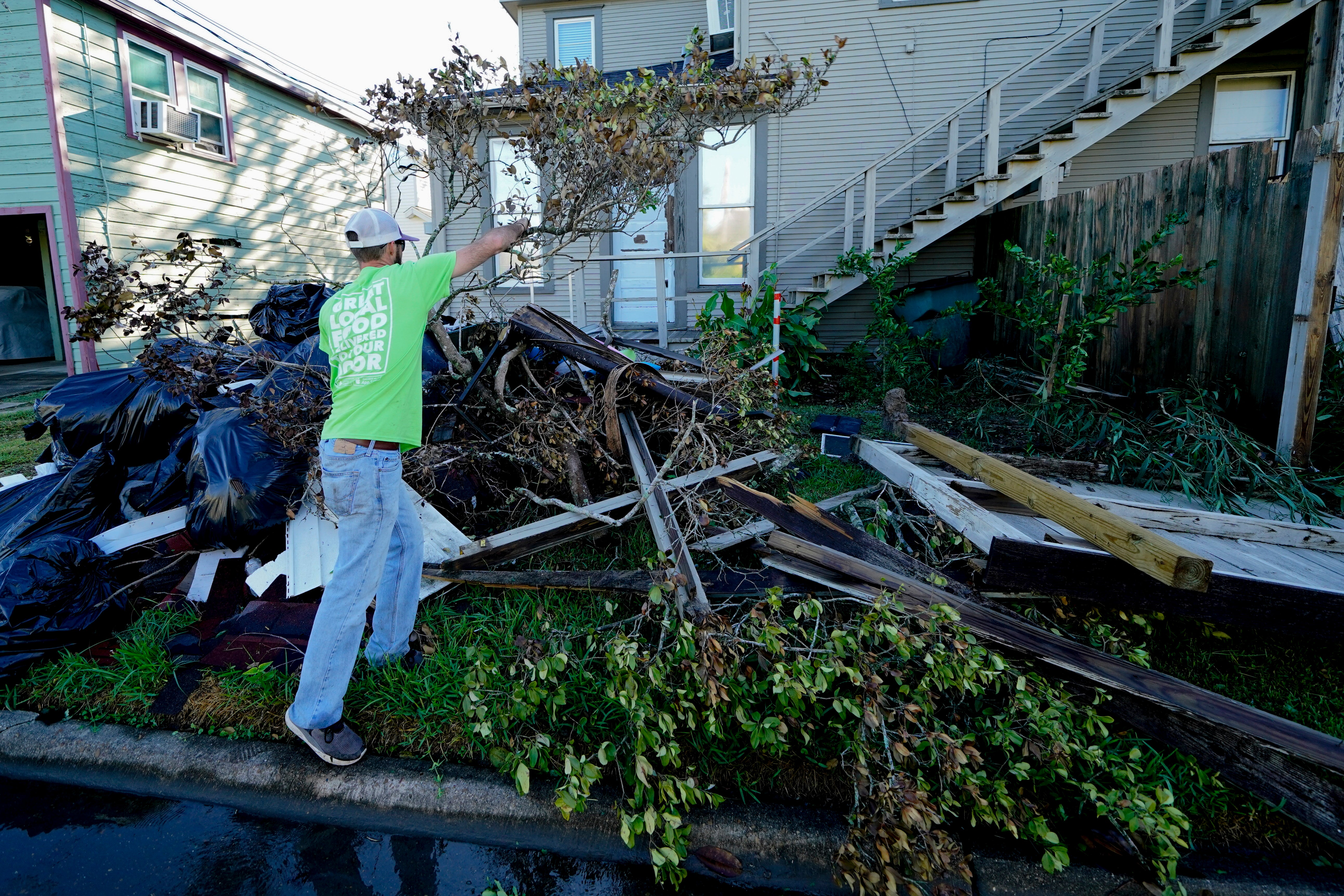In hurricane-ravaged Louisiana, residents dig out, again
Louisiana residents are once again dodging overturned cars on the roads, trudging through knee-deep water to find their homes flooded and pledging to rebuild after Hurricane Delta blew through the besieged part of the state

A blue tarp covered a hole in their roof, torn open when the last hurricane blew through. Friday night, the next hurricane tried to rip the tarp away.
Earnestine and Milton Wesley had decided to ride out Hurricane Delta in their Lake Charles home, damaged just weeks earlier by Hurricane Laura As the wind rustled the tarp above them, they grabbed it through the hole in the ceiling and held on tight. Water poured in, flooding their den.
“We fought all night long trying to keep things intact,” Milton said. “And with God’s help we made it.”
Delta made landfall Friday evening near the coastal town of Creole with top winds of 100 mph (155 kph). It moved over Lake Charles, a city where Hurricane Laura damaged nearly every home and building in late August.
No deaths had been reported by Saturday evening, but a hurricane’s wake can be treacherous. Seven of the 32 deaths attributed to Laura came the day that hurricane struck. Many others were caused by carbon monoxide poisoning from generators, and 10,000 utility workers were dispatched Saturday to get power restored to thousands of customers.
Lake Charles Mayor Nic Hunter estimated that hundreds of already battered homes took on water. And people were already exhausted and stressed — for two weeks the Wesleys had been sleeping on their back porch to escape the heat because they had no power.
“Add Laura and Delta together and it’s just absolutely unprecedented and catastrophic,” Hunter said. “We are very concerned that with everything going in the country right now that this incident may not be on the radar nationally like it should be.”
Before Friday’s storm, the streets were already lines with mountains of debris from the prior storm — piles of soggy insulation, moldy mattresses, tree limbs, twisted metal siding, ruined family treasures.
While Delta was a weaker storm than Category 4 Laura, it inflicted most of its damage with rain instead of wind. Louisiana Gov. John Bel Edwards said it dumped more than 15 inches (38 centimeters) of rain on Lake Charles over two days and more than 10 inches (25 centimeters) on Baton Rouge.
The floodwaters surged up the Wesley family’s front yard, and they were terrified it would pour inside but it stopped short of the door. It carried with it bags of trash and muck, swept up from their neighbors’ piles of debris from the prior storm.
“The water was something else last night,” Milton said. “We’ve never seen it flood so bad out here, to the point I could have swam out here last night, that’s just how deep it was.”
On Saturday, they joined other southern Louisiana residents starting the routine yet again: dodging overturned cars on the roads, chain-sawing fallen trees, trudging through knee-deep water to flooded homes with ruined floors and no power, pledging to rebuild.
Edwards said 3,000 Louisiana National Guard soldiers were mobilized to clear roads and distribute meals and tarps.
Delta rapidly weakened once it moved onto land and slowed to a tropical depression Saturday. Forecasters warned that heavy rain, storm surge and flash floods continued to pose dangers from parts of Texas to Mississippi. Forecasters said remnants could spawn tornadoes in Tennessee Valley into Sunday, and flash floods could hit the southern Appalachians.
Delta, the 25th named storm of an unprecedented Atlantic hurricane season, was the 10th to hit the mainland U.S. this year, breaking a record set in 1916, Colorado State University researcher Phil Klotzbach said.
The governor said Delta disrupted state efforts to set up temporary housing in southwest Louisiana to bring back Laura evacuees scattered across hotels. More than 9,400 people were being sheltered by the state Saturday, but only 935 were Delta evacuees, Edwards said. The others were still displaced by Laura.
Many people who had started repairing their homes from Laura saw the work undone overnight and the materials they bought “just scattered about because of the wind," he said. “Again, it’s going to set us back, but it’s not going to dictate our future.”
The the double punch of the storms — on top of the pandemic — has left many reeling, said Lake Charles resident Katie Prejean McGrady.
She was nine months pregnant when she and her family evacuated ahead of Laura. They fled a couple hours north and she had to find a new doctor to deliver her baby. They lost part of their roof, their fence and their swing set.
They arrived back in Lake Charles last weekend and had to evacuate again days later, debris from Laura still in their yard.
“I’m taxed out. And I think that’s most people in town,” she said. “There’s a mental exhaustion that sets in and then there’s a fear of ‘Does anybody outside this region care?’”
__
Associated Press contributors include Santana and Gerald Herbert in Lake Charles, Melinda Deslatte in Baton Rouge; Seth Borenstein in Kensington, Maryland; Alanna Durkin Richer in West Harwich, Massachusetts and Sophia Tulp in Atlanta.
Bookmark popover
Removed from bookmarks